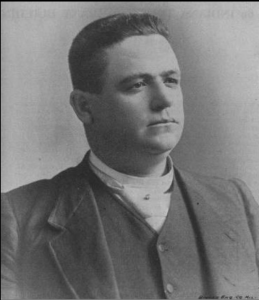
(Oct. 13, 1851-Dec. 27, 1894). Controversial chairman of the Democratic Party, Simeon Coy was a native of Greensburg, Indiana, Coy. He moved to Indianapolis in 1863, and from 1866 to 1875 he worked as a painter at the Shaw Carriage Works. In 1875, he went into the saloon business. From 1878 to 1886, Coy served as a member of the City Council, and in 1884 he became chairman of the Marion County , a position to which he was reelected in 1886.
Known as a pleasant and affable man by many, behind the scenes Coy was tied to corruption during his years on the council. He made sure that saloons and gambling halls had the reassurance that they would remain open, regardless of their practices.
Coy’s corruption did not become widely known, however, until his tenure as chairman of the Marion County Democratic Party. Following the election of 1886, Coy and 11 other party officials were accused of tampering with tally sheets in order to secure the election of the Democratic candidate for judge of the criminal court. In February 1888, Coy was convicted in the second of three trials that comprised the .
Even though in prison, he remained a member of the council. Upon his release, he was reelected in October 1889, for another term. That same year Coy published his account of the case. In (1889), he argued that the tally-sheet case had been manufactured by officials as a means of eliminating their more successful counterparts in the local Democratic Party.
After leaving politics Coy went back into the saloon and gambling business, but laws that made gambling illegal left him virtually penniless. After his death, the called him “the most picturesque political character in the history of Indiana.”

Help improve this entry
Contribute information, offer corrections, suggest images.
You can also recommend new entries related to this topic.